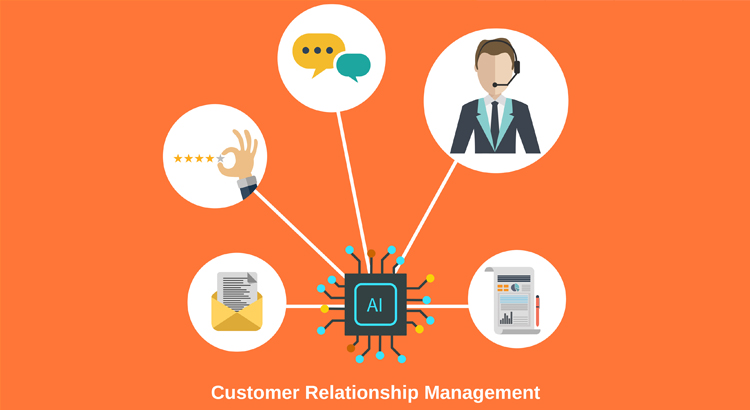How often do we hear people say ‘customer is king’? It’s not just a popular phrase – it’s the reality of how businesses should operate. Companies have been using customer relationship management (CRM) tools for a long time to manage their customer interactions and improve the overall customer experience. However, the rise of artificial intelligence (AI) has revolutionized the way businesses approach CRM.
Artificial Intelligence (AI) is gaining more attention and becoming an increasingly popular technology in many industries. One area where AI can be impactful is in Customer Relationship Management (CRM). In recent years, CRM has become a fundamental aspect of many businesses, as it helps companies connect, manage, and maintain their relationships with customers as well as acquire new ones. AI has the potential to transform the way businesses interact with their customers, and it can have positive impacts on several areas, including analyzing sales calls, improving data acquisition and organization, customer satisfaction and confidence, follow-up with leads, automation of operations of the service desk, and acting as a consultant. Enhance CRM with Leadzen.ai‘s B2B lead generation Solutions
In this article, we will explore the incredible impact of AI on CRM and how it can help businesses improve customer interactions, reduce operational costs, and drive revenue growth. We’ll dive into some of the key ways AI is already being used in CRM, and how it’s poised to continue transforming the way companies approach customer relationship management in the future.
Artificial Intelligence in Business
Integrating AI in business processes is becoming more popular, as the technology improves and becomes more accessible. AI technology has already had an impact on many areas of business, including supply chain, logistics, and finance. It has changed the way businesses operate, allowing them to make better decisions, automate processes, and improve efficiency.
AI in CRM
CRM is about the management of customer interactions with a business. It’s a way to keep track of every interaction between a customer and a business, from the first contact to the final purchase. The goal of CRM is to build and maintain relationships with both existing and potential customers. And AI has already impacted CRM in several ways.
The Role of AI in CRM
One of the reasons why AI is becoming more popular in CRM is that it can help businesses analyze customer data. AI tools for businesses can help identify patterns and trends in customer behavior, as well as improve data accuracy and organization.
AI can also help businesses interact with customers in a more personalized way. With the help of machine learning and big data analytics, businesses can create personalized marketing campaigns and provide specific product recommendations based on customer behavior and interaction.
Benefits of Integrating AI into CRM
1. Improved Data Acquisition and Organization
One of the primary benefits of integrating AI into CRM is the ability to improve data acquisition and organization. AI can automatically collect, analyze, and categorize customer data, making it easier for businesses to understand their customers better. By making use of real-time engagement data, businesses can make informed decisions and provide more personalized customer service.
2. Analyze Sales Calls
AI technology can also be used to analyze sales calls, monitor customer interactions, and identify any gaps in the process. This can help businesses get insights into their sales teams’ performance, identify any areas for improvement, and provide better training for their employees.
3. Customer Satisfaction and Confidence
AI can also help businesses improve customer satisfaction and confidence. By providing personalized marketing campaigns and product recommendations based on customer behavior and interaction, businesses can make the customer feel more valued. AI can also analyse customer feedback and complaints, making it easier for businesses to respond quickly and offer solutions.
4. Saves Money and Time
By automating processes, AI can save businesses both time and money. For example, AI can help automate routine tasks such as scheduling appointments, making follow-up calls, and sending personalized emails to customers. AI can help automate routine tasks such as scheduling appointments, making follow-up calls, and sending personalized emails to customers. When integrated with your CRM email campaign, this automation can significantly enhance customer engagement and conversion rates. This frees up employees to focus on other important tasks and helps to increase productivity.
5. Follow Up with Leads
Another benefit of AI in CRM is the ability to follow up with leads quickly and effectively. By automating the lead generation process, AI can help businesses reach out to potential customers and follow up with them until they are ready to buy.
Also by using popups, you can significantly improve your chances of acquiring new customers, making the process much easier and more effective. Employing popup plugin enables you to create this effective tool with ease.
6. Automation of Operations of the Service Desk
AI can also automate the operations of the service desk. For example, by incorporating chatbots, businesses can provide round-the-clock customer service and automate routine tasks such as booking appointments and scheduling follow-up calls.
7. Acts as a Consultant
AI can also act as a consultant by providing valuable insights into customer behavior and identifying any areas for improvement. AI can analyze data from different sources, including social media, customer reviews, and purchasing behavior, to provide an advanced understanding of customer trends.
Some Thoughts on AI and the Future of CRM
1. Virtual Assistant
One of the most intriguing areas where AI can transform CRM is the development of virtual assistants. Virtual assistants can provide personalized support, automate routine tasks, and deliver a high level of customer service. A virtual assistant can also help businesses access customer data quickly and easily.
2. Automated Data Capturing
AI can also help businesses capture and analyze data more efficiently. By automating data capturing, businesses can obtain accurate data in real-time, making it easier to monitor customer behavior and make informed decisions.
User Retention
Another way AI can impact CRM is through user retention. AI can help businesses create personalized marketing campaigns and monitor customer feedback, making it easier to keep customers engaged and loyal.
Sales Enablement
AI can also help businesses improve their sales process. By using AI technology to analyze customer data and provide insights on customer behaviour, businesses can target their sales efforts more precisely.
The Significance of AI in Mobile Apps for eLearning
eLearning mobile apps are becoming increasingly popular, and AI technology is playing a significant role in their development. AI technology is being used to create personalized learning experiences, where the app can tailor the content and lessons to the user’s needs and learning style.
AI technology is also being used in language learning apps, where it can help improve conversational skills, vocabulary, and pronunciation. It can provide feedback on grammar, vocabulary, and pronunciation, making the learning experience more effective and engaging.
AI technology can also be used in educational mobile apps to provide students with instant feedback on their work. By using natural language processing and machine learning algorithms, these apps can evaluate the student’s work and provide feedback that is relevant and specific to their needs.
The Growing Importance of Artificial Intelligence
AI technology is becoming increasingly prominent in many areas of our lives, from healthcare to finance, transportation, and entertainment. AI is already being used to improve patient care, diagnose diseases, and develop new treatments.
In the finance industry, AI technology is being used to detect fraudulent transactions and improve investment decisions. In transportation, AI technology is being used to optimize routes, improve safety, and reduce environmental impact.
AI technology is also being used in the entertainment industry to create personalized content and improve user engagement. By analyzing user data such as search history, watch history, and user ratings, AI algorithms can recommend content that is tailored to the user’s interests and preferences.
Understanding the Increasing Popularity of Artificial Intelligence
Artificial intelligence is becoming popular because it offers a range of benefits over traditional technologies. AI algorithms can analyze large amounts of data quickly and accurately, making it possible to detect patterns and insights that would be impossible to identify manually.
AI technology can also automate repetitive tasks and improve efficiency, allowing organizations to save time and money. AI algorithms can learn and adapt to new situations, making them more flexible and versatile than traditional technologies.
Additionally, AI technology can provide personalized experiences, making it possible to tailor content and services to the user’s needs and preferences.
Top AI Technologies for Mobile App Development
There are several AI technologies that can be used in mobile app development, including:
1. Natural language processing (NLP)
NLP technology can be used to develop voice assistants and chatbots that can understand and respond to user queries in natural language. This technology can provide a more personalized and engaging experience for users.
2. Predictive analytics
Predictive analytics can be used to analyze user data and provide personalized recommendations for content, products, and services. This technology can improve user engagement and increase customer retention.
3. Facial recognition
Facial recognition technology can be used in mobile app development to provide advanced security features or for augmented reality experiences. This technology can improve the user experience and make mobile apps more engaging and immersive.
4. Machine learning
Machine learning algorithms can be used to analyze large amounts of data and provide personalized recommendations and insights. This technology can improve efficiency, reduce costs, and increase customer satisfaction.
5. Chatbots
Chatbots can be used to provide personalized customer service and support. By using AI algorithms, chatbots can understand and respond to user queries in natural language, providing a more engaging and efficient experience for users.
Wrap Up
In conclusion, the integration of artificial intelligence in customer relationship supplier management has revolutionized the way businesses interact with their customers and market themselves. AI technology has enabled companies to predict consumer buying behaviors, personalize customer experiences, and improve overall communication with customers through chatbots and virtual assistants. As AI continues to evolve, so does the potential for even greater advancements in customer relationship management. As businesses strive to stay ahead of the competition, incorporating AI into their CRM strategy is becoming increasingly essential for creating a truly personalized customer experience and enhancing customer loyalty.







